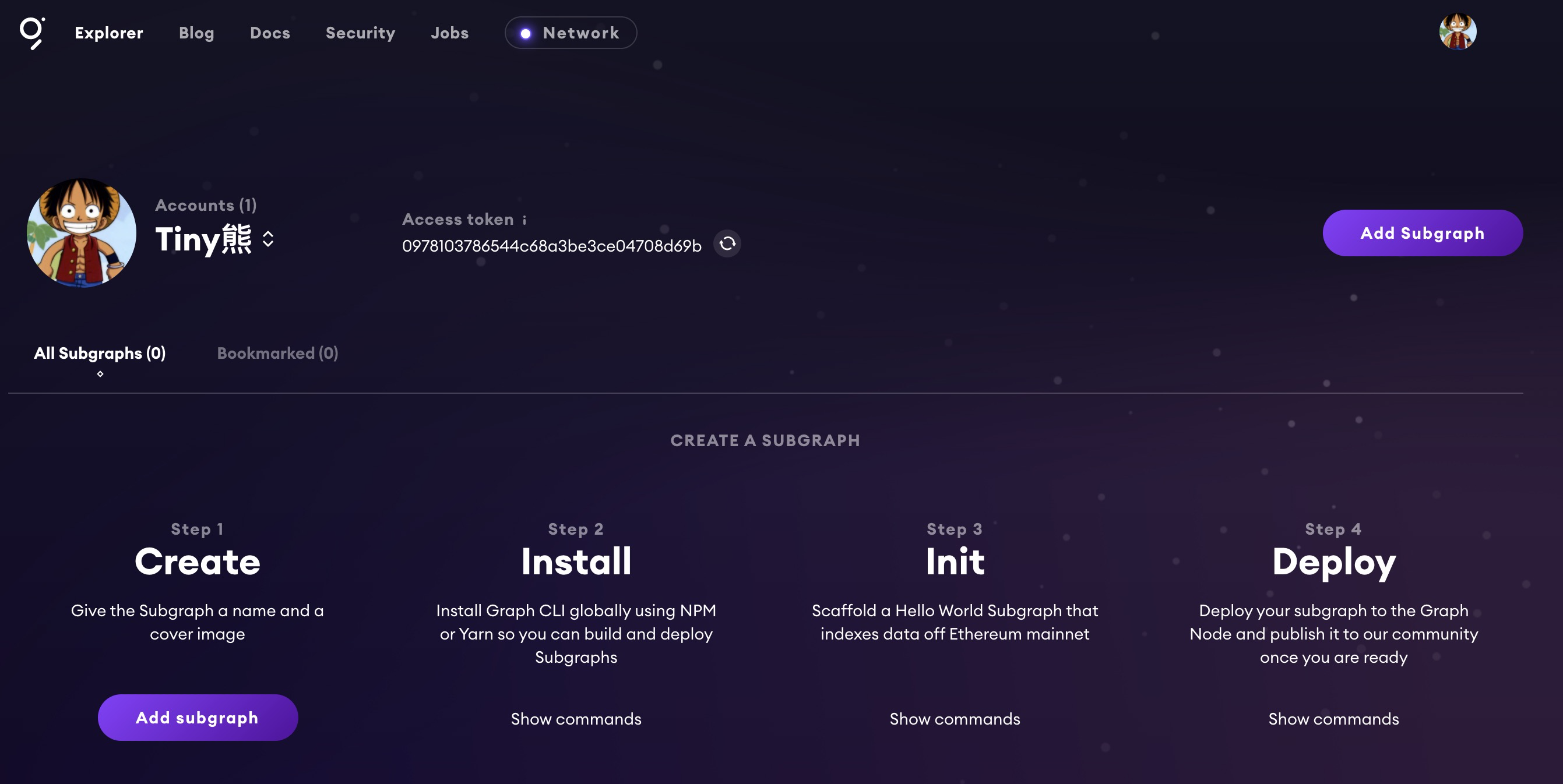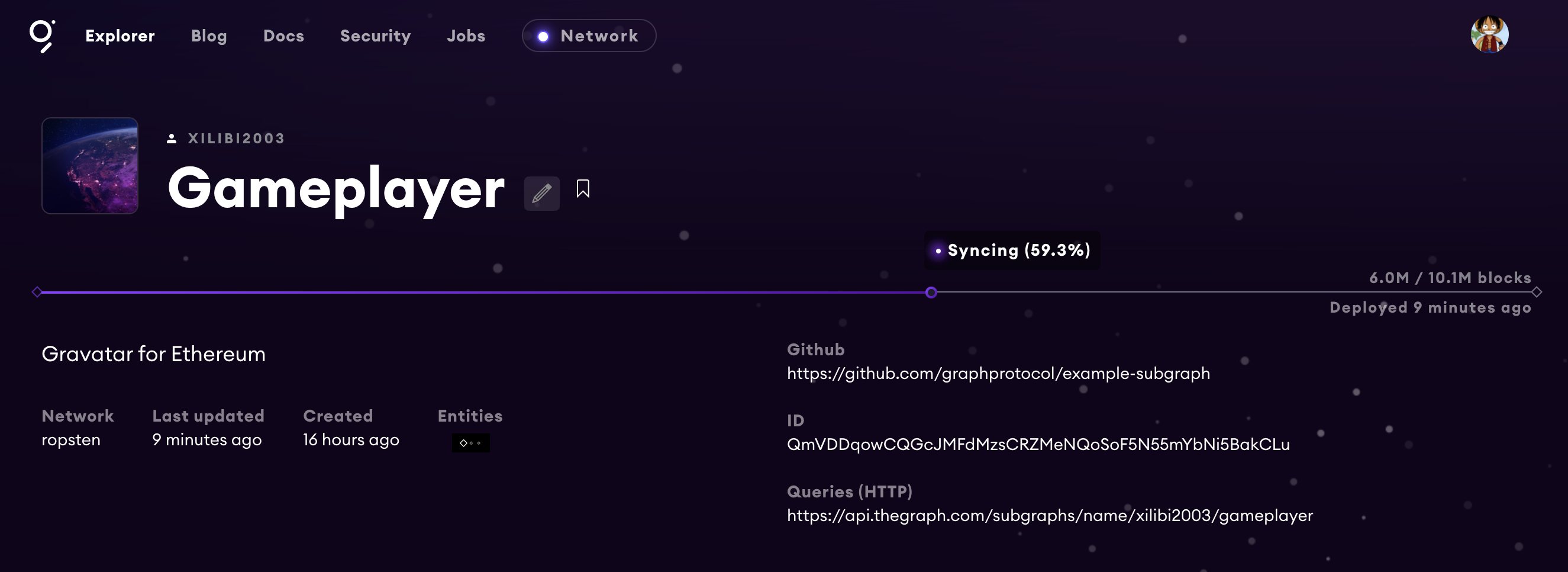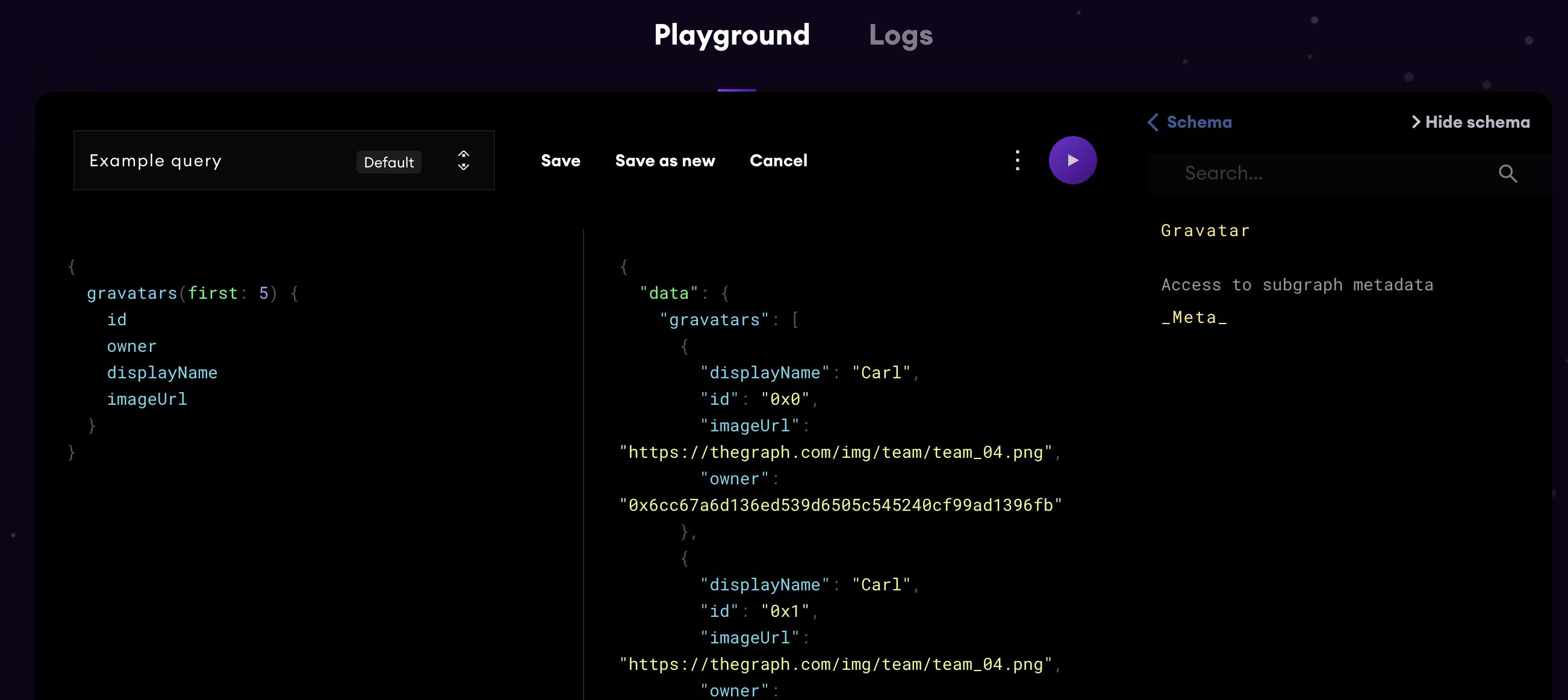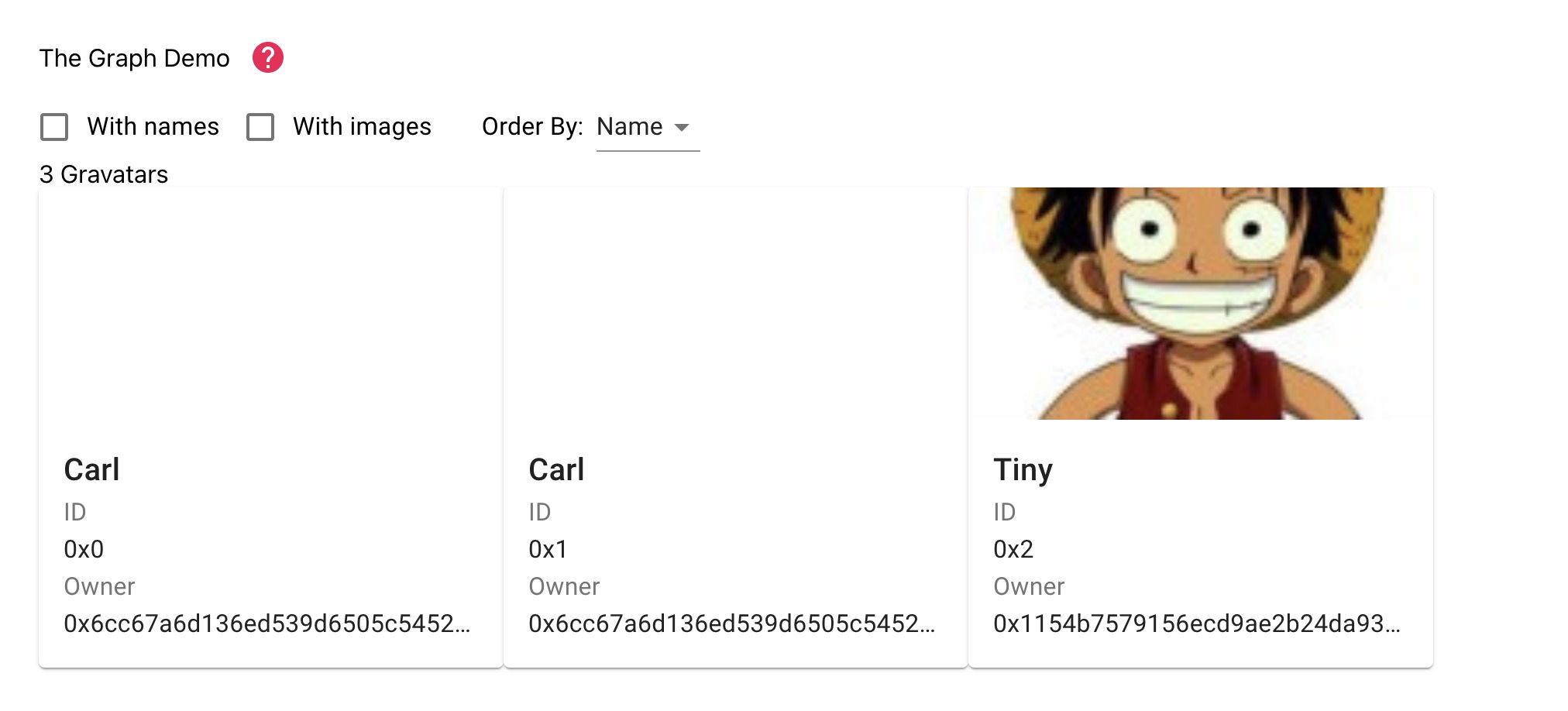The Graph入门教程:如何索引合约事件
- Tiny熊
- 发布于 2021-04-29 18:48
- 阅读 19292
一篇完整的TheGraph教程,学习到 定义数据索引的Subgraph并部署,以及前端 DApp 中查询索引数据。
编写智能的合约时,通常状态的变化是通过触发一个事件来表达,The Graph则是捕捉区块链事件并提供一个查询事件的GraphQL接口,让我们可以方便的跟踪数据的变化。 实际上很多 DEFI 协议及都是The Graph来基于查询数据。
这篇TheGraph教程在官方的教程基础上,进行了一些补充扩展主要包含以下内容:
- 在Ropsten部署一个合约,并调用触发事件。
- 创建定义数据索引的Subgraph。
- 部署Subgraph到TheGraph,实现数据索引。
- 在前端 DApp 中查询索引数据。
本教程的完整代码已上传到 GitHub: https://github.com/xilibi2003/Gameplayer
1. 合约开发与部署
克隆教程的代码,在contracts下可以看到GravatarRegistry智能合约,用户可以调用GravatarRegistry合约来创建及更新自己的昵称和头像,合约关键代码如下:
contract GravatarRegistry {
event NewGravatar(uint id, address owner, string displayName, string imageUrl);
event UpdatedGravatar(uint id, address owner, string displayName, string imageUrl);
struct Gravatar {
address owner;
string displayName;
string imageUrl;
}
Gravatar[] public gravatars;
mapping (uint => address) public gravatarToOwner;
mapping (address => uint) public ownerToGravatar;
function createGravatar(string _displayName, string _imageUrl) public {
require(ownerToGravatar[msg.sender] == 0);
uint id = gravatars.push(Gravatar(msg.sender, _displayName, _imageUrl)) - 1;
gravatarToOwner[id] = msg.sender;
ownerToGravatar[msg.sender] = id;
emit NewGravatar(id, msg.sender, _displayName, _imageUrl);
}
function updateGravatarName(string _displayName) public {
require(ownerToGravatar[msg.sender] != 0);
require(msg.sender == gravatars[ownerToGravatar[msg.sender]].owner);
uint id = ownerToGravatar[msg.sender];
gravatars[id].displayName = _displayName;
emit UpdatedGravatar(id, msg.sender, _displayName, gravatars[id].imageUrl);
}
}可以看到合约里在创建和更新时分别触发了 NewGravatar 和 UpdatedGravatar 事件,稍后再subgraph里,将跟踪这两个事件,但是需要我们先把合约部署到网络上,这里使用以太坊测试网Ropsten(使用其他的网络也是一样的):
module.exports = {
networks: {
ropsten: {
provider: function() {
return new HDWalletProvider(
process.env.MNEMONIC,
`https://ropsten.infura.io/v3/${process.env.ROPSTEN_INFURA_API_KEY}`
)
},
network_id: '3',
},
}
}这里为了安全考虑,把助记词和 API KEY 保存在
.env文件中
添加部署脚本2_deploy_contract.js:
const GravatarRegistry = artifacts.require('./GravatarRegistry.sol')
module.exports = async function(deployer) {
await deployer.deploy(GravatarRegistry)
}添加执行交易脚本,以便触发事件3_create_gravatars.js:
const GravatarRegistry = artifacts.require('./GravatarRegistry.sol')
module.exports = async function(deployer, network, accounts) {
const registry = await GravatarRegistry.deployed()
console.log('Account address:', registry.address)
await registry.createGravatar('Carl', 'https://thegraph.com/img/team/team_04.png', {
from: accounts[0],
})
}然后执行 truffle migrate --network ropsten 以便完成部署和执行createGravatar交易,控制台里会打印出GravatarRegistry合约部署的地址,复制这个合约地址,后面在编写subgraph需要使用到。
2. 创建定义数据索引的Subgraph
TheGraph中定义如何为数据建立索引,称为Subgraph,它包含三个组件:
- Manifest 清单(subgraph.yaml) - 定义配置项
- Schema 模式(schema.graphql) - 定义数据
- Mapping 映射(mapping.ts) - 定义事件到数据的转换
后面我们将逐一介绍他们的作用及如何来编写。
在TheGraph创建一个 Subgraph 空间
因为需要借助 TheGraph 的节点来完成数据的索引,因此我们需要在[TheGraph网站](Browse and Explore Subgraphs (thegraph.com))上创建一个Subgraph。
如果你有自己的私有链,这可以克隆Graph节点代码(https://github.com/graphprotocol/graph-node/),自己运行Graph节点来完成数据的索引。
如果没有The Graph 的账户,可以用GitHub注册。创建账户之后,进入仪表盘就可以开始通过界面创建subgraph,进入你的仪表板,并点击Add Subgraph:

可以为你的 subgraph 选择一个图像,定义一个名称。完成后点击保存,一个新的、未部署的subgraph将显示在仪表板上。
开发和部署subgraph
先使用Yarn或NPM在全局安装Graph CLI:
$ npm install -g @graphprotocol/graph-cli
$ yarn global add @graphprotocol/graph-cli初始化配置
使用graph init 创建一个subgraph项目:
$ graph init <GITHUB_USERNAME>/<SUBGRAPH_NAME> <DIRECTORY><GITHUB_USERNAME>是必需的,这是你的GitHub用户名<SUBGRAPH_NAME>是必需的,这是你的前面创建subgraph项目的名称<DIRECTORY>是可选的,它是创建subgraph的子目录的名称。
这个命令也可以加入参数 --from-example ,基于官方的示例创建项目。
> graph init xilibi2003/Gameplayer
✔ Subgraph name · xilibi2003/Gameplayer
✔ Directory to create the subgraph in · Gameplayer
✔ Ethereum network · ropsten
✔ Contract address · 0x8CfDDbD441Fc6ffE3c02244a6B93EF9e89FaFA4D
✖ Failed to fetch ABI from Etherscan: request to https://api-ropsten.etherscan.io/api?module=contract&action=getabi&address=0x8CfDDbD441Fc6ffE3c02244a6B93EF9e89FaFA4D failed, reason: connect ETIMEDOUT 103.240.180.117:443
✔ ABI file (path) · build/contracts/GravatarRegistry.json
✔ Contract Name · Gravatargraph init会提示我们选择以太坊网络、输入合约地址、提供合约 ABI、及合约名称,这些信息用来帮助创建Subgraph的配置清单文件:subgraph.yaml:
specVersion: 0.0.1
schema:
file: ./schema.graphql
dataSources:
- kind: ethereum/contract
name: GravatarRegistry
network: ropsten
source:
address: "0x8CfDDbD441Fc6ffE3c02244a6B93EF9e89FaFA4D"
abi: GravatarRegistry
mapping:
kind: ethereum/events
apiVersion: 0.0.2
language: wasm/assemblyscript
entities:
- NewGravatar
- UpdatedGravatar
abis:
- name: GravatarRegistry
file: ./abis/GravatarRegistry.json
eventHandlers:
- event: NewGravatar(uint256,address,string,string)
handler: handleNewGravatar
- event: UpdatedGravatar(uint256,address,string,string)
handler: handleUpdatedGravatar
file: ./src/mapping.tssubgraph.yaml 配置文件通常会定义这些内容:
- 要索引哪些智能合约(地址,网络,ABI...)
- 监听哪些事件
- 其他要监听的内容,例如函数调用或块
- 被调用的映射函数(mapping.ts)
在这里可以找到如何定义subgraph.yaml的详细文档。
定义模式
编写自己的模式 schema.graphql,模式是GraphQL数据定义。允许我们定义实体及其类型,这里我们在schema.graphql定义一个Gravatar实体:
type Gravatar @entity {
id: ID!
owner: Bytes!
displayName: String!
imageUrl: String!
}ID ,Bytes及 String 是GraphQL数据类型,!表示该值不能为空。模式的定义文档可以在这里找到:https://thegraph.com/docs/define-a-subgraph#the-graphql-schema。
定义映射(mapping.ts)
TheGraph中的映射文件定义了如何将传入事件转换为实体的函数。它用TypeScript的子集AssemblyScript编写。因此可以将其编译为WASM(WebAssembly),以更高效,更便携式地执行映射。
需要定义subgraph.yaml文件中每个handler函数,因此在我们的例子中,我们需要实现函数:handleNewGravatar 及 handleUpdatedGravatar。
TheGraph 提供了一个命令:graph codegen 可以生成解析事件的代码及模式实体代码,因此只需要基于生成的代码编写映射函数,mapping.ts 定义如下:
import { NewGravatar, UpdatedGravatar } from '../generated/Gravity/Gravity'
import { Gravatar } from '../generated/schema'
export function handleNewGravatar(event: NewGravatar): void {
let gravatar = new Gravatar(event.params.id.toHex())
gravatar.owner = event.params.owner
gravatar.displayName = event.params.displayName
gravatar.imageUrl = event.params.imageUrl
gravatar.save()
}
export function handleUpdatedGravatar(event: UpdatedGravatar): void {
let id = event.params.id.toHex()
let gravatar = Gravatar.load(id)
if (gravatar == null) {
gravatar = new Gravatar(id)
}
gravatar.owner = event.params.owner
gravatar.displayName = event.params.displayName
gravatar.imageUrl = event.params.imageUrl
gravatar.save()
}在handler函数,我们使用事件的ID 创建Gravatar实体。并使用相应的字段填充数据,最后需要.save()来存储实体。
如何编写映射函数,还可以参考文档:https://thegraph.com/docs/define-a-subgraph#writing-mappings。
接下来就是 把编写好的Subgraph部署到 TheGraph
3. 部署 Subgraph
在控制台先用graph auth 进行授权:
graph auth https://api.thegraph.com/deploy/ <ACCESS_TOKEN><ACCESS_TOKEN> 请使用你在创建 Subgraph 空间提示的Access token。
然后使用graph deploy进行部署:
graph deploy \
--debug \
--node https://api.thegraph.com/deploy/ \
--ipfs https://api.thegraph.com/ipfs/ \
<SUBGRAPH_NAME><SUBGRAPH_NAME> 使用完成的Subgraph名称,我们这里是:xilibi2003/Gameplayer 。
如果顺利的话,可以在TheGraph 的面板上观察到subgraph索引过程,初始索引可能需要等待几分钟, 如下图:

当索引完成后,通过Graph Explorer中的GraphQL playground 进行交互查询:

4. DApp前端查询索引数据
在我们的代码库中,front 目录中,已经提供一个 示例DApp,用来访问数据。进入应用程序目录,配置查询subgraph的GraphQL端点地址:
$ cd front
$ echo 'REACT_APP_GRAPHQL_ENDPOINT=https://api.thegraph.com/subgraphs/name/<GITHUB_USERNAME>/<SUBGRAPH_NAME>' > .env最后,安装DApp的依赖并启动项目。
$ yarn && yarn start可以看到通过GraphQL查询出来了 3 条数据:

在React前端使用了ApolloClient 来集成GraphQL查询, 如果是 Vue 可以使用 Vue Apollo 。
GraphQL查询的代码可以在 front/App.js 找到,这里不做详细介绍。

